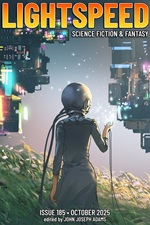“O Mechfighter, O Starsinger” by Osahon Ize-Iyamu
“At the Bottom of the Bonfire” by Martin Cahill
“The Porniest Porn in Porntown” by Stephen Graham Jones
“Dirge and Gleam” by Micah Dean Hicks
“Everyone Hates the Auditor” by Megan Chee
“Dating Fortune’ by Sean McMullen
“Thaw” by An Owomoyela
“Drosera regina” by A.L. Goldfuss
Reviewed by Mike Bickerdike
“O Mechfighter, O Starsinger” by Osahon Ize-Iyamu is an SF short story, though to call it a story is somewhat generous, as there is next to no plot. A trafficked and abused individual named ‘Starsinger’ travels to a far off world, and spends all their time singing, with consequences limited to melodramatic metaphors rather than any clear concrete outcomes. Interspersed with the sections focussed on Starsinger, the point of view switches to a second individual who is training as a ‘Mechfighter’. Rather than follow traditional training methods this person prefers to dance in their mechanical suit and complain that they feel misunderstood. Both characters are rather unappealing, given their self-pity, and both are heavily beset by unlikely metaphors. Any sense of place, or the story’s point, is well hidden by the author’s poetic and flowery prose, and overall this was a chore to read.
“At the Bottom of the Bonfire” by Martin Cahill is flash fiction, recounting how the protagonist has burned his bridges to anyone he’s had relationships with, even eventually to himself. I don’t know if the author set out to write the most maudlin work possible, but it seems that way. There are unfortunately no interesting speculative ideas here to support the thin premise, and the writing is overly flowery. Despite its brevity, it could be skipped.
“The Porniest Porn in Porntown” by Stephen Graham Jones continues the experimental theme of this issue of Lightspeed, being constructed of a single dense paragraph. While this makes the piece less digestible (and it seems to be an unnecessary stylistic affectation), it is actually better than the stories preceding it. In a dystopian future where health and water are treasured, a video of a woman taking a shower is a shocking catalyst for the masses. Recommended.
“Dirge and Gleam” by Micah Dean Hicks is a fantasy novelette. The world building is quite good and presents some novel fantasy ideas. To conduct magic, one must be ‘tethered’ to specific emotions, and these tethers are largely dictated by fate. Young people learn to control their magic through attendance at ‘Spindle Lost’, a school of magic. This school is far-removed from the cosy residence of Hogwarts, being more bleak, challenging and suggestive of the horror genre. Overall, the scenery and ideas that frame the story are interesting and engaging. This is just as well, as the prose is overly-laden with adjectives and simile (especially at the start), and the tale drops us into the middle of things with little explanation—we have to read some way through dense purple prose to understand the world. As it progresses, the style settles down however and makes more and more sense and, by the end, the story is quite neatly concluded. Ultimately quite good, this novelette repays perseverance.
“Everyone Hates the Auditor” by Megan Chee is an amusing SF short story. A financial auditor visits a space station to assess the valuation of ‘Galactic Curiosities Inc.’ stock. The style is appealingly wry and funny and seems like a throwback to humorous tales from the likes of Laumer or Robinson. The idea is also quite novel. While it’s not the deepest piece, it is engaging and readable; recommended.
“Dating Fortune’ by Sean McMullen is urban fantasy flash fiction. A young mathematician dying of cancer meets the personification of fortune—an attractive woman who takes him for an interesting date. The story is quite neat and memorable, with a perceptive idea at its heart.
“Thaw” by An Owomoyela is SF flash fiction, told from the perspective of an alien being, that needs to incorporate other creatures to grow and survive, following its thawing cycle. While the idea is somewhat inventive, the complete lack of any human perspective or relatable tension means it struggles to generate much interest.
“Drosera regina” by A.L. Goldfuss is a horror fantasy tale. A young woman is cursed with a strange body. When she has sex with the ‘wrong’ kind of men—seedy, deceiving, violent men—she exudes a caustic dew like a sundew plant, leading to burning and digestion of the victim. Taking to the road, to work through her problem, she both violently exploits her ‘power’ and also despairs of it. The idea is quite intriguing, and for a story that centres on a sexually driven fantasy theme, it manages to avoid being salacious or tasteless. Well-written, this is a decent story to conclude the issue.
More of Mike Bickerdike’s reviews and thoughts on science-fiction can be found at https://starfarersf.nicepage.io/
 Lightspeed
Lightspeed